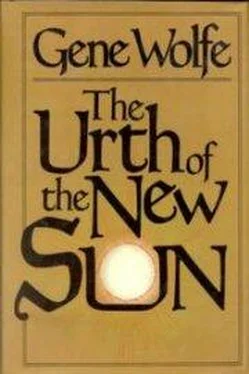The thunder that had been so distant sounded again, nearer now, the voice of a column of night-black cloud that outreached even the arm of Typhon’s colossal figure. The Praetorians had laid down the food and drink they had brought at some distance from my little shelter. (Such service is the price of undying loyalty; those who profess it seldom labor quite so diligently as a common servant whose loyalty is to his task.) I went out, the smilodon with me, to carry it back to whatever protection we could give it. The wind had already begun her storm song, and a few raindrops splattered the rock before us, as big as plums and icy cold.
“This is as good a chance as you’ll ever have,” I told the smilodon. “They’re running for shelter already. Go now!”
It leaped away as though it had been awaiting my consent, clearing ten cubits at every bound. In a moment it had vanished over the edge of the arm. In a moment more it reappeared, a tawny streak darkening to rain-wet brown from which workers and soldiers fled like coneys. I was glad to see that, for all the weapons of beasts, no matter how terrible they seem, are merely toys compared to the weapons of men.
Whether it returned safely to its hunting grounds, I am unable to say, though I trust it did. As for myself, I sat under my shelter for a time listening to the storm and munching bread and fruit, until at last the wild wind snatched the canvas from over my head.
I rose; when I looked through the curtains of the downpour, I saw a party of soldiers cresting the arm.
Astonishingly I also saw places without rain or soldiers. I do not mean that these newly seen places now spread themselves where the abyss had stretched. Its aching emptiness remained, rock dropping a league at least like a cataract, with the dark green of the high jungle far below — the jungle that would hold the village of sorcerers through which the boy Severian and I would pass.
Rather it seemed to me that the familiar directions of up and down, forward and back, left and right, had opened like a blossom, revealing petals unguessed, new Sefiroth whose existence had been hidden from me until now.
One of the soldiers fired. The bolt struck the rock at my feet, splitting it like a chisel. Then I knew they had been sent to kill me, I suppose because one of the men who had gone with the chiliarch had rebelled against his fate and reported what had transpired, though too late to prevent the departure of the rest.
Another leveled his weapon. To escape it, I stepped from the rain-swept rock into a new place.
Chapter XL — The Brook Beyond Briah
I STOOD in flower-spangled grass, sweet-smelling and softer than any other I have known; overhead the sky was azure, racked with clouds that hid the sun and barred the upper air with indigo and gold. Faintly, very faintly, I could still hear the roar of the storm that swept across Mount Typhon . Once there came a flash — or rather the shadow of a flash, if such a thing can be imagined — as if lightning had struck the rock, or one of the Praetorians had fired again.
When I had taken two steps, these things were no longer to be discerned; yet it seemed not so much that they were gone as that I had lost the ability (or perhaps only the will) to detect them, as when grown we no longer see things that interested us as children. Surely, I thought, this cannot be what the green man called the Corridors of Time. There are no corridors here, but only hills and waving grass and a sweet wind.
As I went farther, it seemed to me that everything I saw was familiar, that I walked in a place where I had been before, though I could not recall what it was. Not our necropolis with its mausoleums and cypresses. Not the unfenced fields where I had once walked with Dorcas and so come upon Dr. Tabs’s stage — those fields had cowered beneath the Wall of Nessus, and there were no walls here. Not the gardens of the House Absolute, full of rhododendrons, grottos, and fountains. Closest, I thought, to the pampas in spring, but for the color of the sky.
Then I heard the song of rushing water, and a moment later I saw its silver gleam. I ran to it, remembering as I ran how once I had been lame, and how I had drunk from a certain stream in Orithyia, then seen the pug marks of a smilodon; I smiled to myself between draughts to think that they would not frighten me now.
When I lifted my head, it was not a smilodon I saw, but a minute woman with brightly colored wings who was wading upon the water-washed stones some distance upstream as though to cool her legs. “Tzadkiel!” I shouted. Then I fell mute with confusion, having recalled the place at last.
She waved and smiled; and, most astonishingly, leaped from the water and flew, her gay wings rippling like dyed faille.
I knelt.
Still smiling, she dropped to the bank beside me. “I don’t think you’ve seen me do that before.”
“Once I saw you — a vision of you — hanging with wide wings in the vacancy between the stars.”
“Yes, I can fly there because there’s no attraction. Here I must be quite small. Do you know what a gravity field is?”
She waved an arm no longer than my hand at the meadow, and I said, “I see this one, mighty Hierogrammate.”
She laughed at that, a music like the tintinnabulation of tiny bells. “But it seems we have met?”
“Mighty Hierogrammate, I am the least of your slaves.”
“You must be uncomfortable there on your knees, and you’ve met another self of mine since I parted from her. Sit down and tell me about it.”
And so I did. And it was pleasant indeed to sit upon that bank, occasionally refreshing my laboring tongue with the cold, clean water of the brook, and recount to Tzadkiel how I had seen her first between the pages of Father Inire’s book, and how I had helped to capture her aboard her own ship, and how she had been male and called herself Zak, and how she had cared for me when I was injured. But you, who are my reader, know all these things (if indeed you exist), because I have written them here, omitting nothing, or at least very little.
When I spoke to Tzadkiel beside the brook, I strove to be as brief as I could; but she would not allow it, urging me down this byway and that one until I had told her of the small angel (of whom I had read in my brown book) who had met Gabriel, and of my childhoods in the Citadel, at my father’s villa, and in the village called Famulorum near the House Absolute.
And at last, when I had paused for breath for perhaps the thousandth time, Tzadkiel said, “No wonder I accepted you; in all those words there was not one lie.”
“I’ve told lies when I thought there was need of them, and even when there was none.”
She smiled and made no answer.
I said, “And I’d lie to you now, mighty Hierogrammate, if I thought my lies would save Urth.”
“You’ve saved her already; you began aboard my ship and you completed your task in our sphere, upon and within the world you call Yesod too. It must have appeared to Agilus and Typhon, and to many of the others who struggled against you, that the fight was an unequal one. If they had been wise, they would have known the fight was over already, some where and some time; but if they had been wise, they would have known you for our servant and not fought against you at all.”
“Then I cannot fail?”
“No, you have not failed. You could have on the ship and later; but you couldn’t die before the test, nor can you now, until your task is accomplished. If it weren’t so, the beating would have killed you, and the weapon in the tower, and much else. But your task will be accomplished soon. Your power is from your star, as you know. When it enters your old sun and brings the birth of the new…”
Читать дальше










